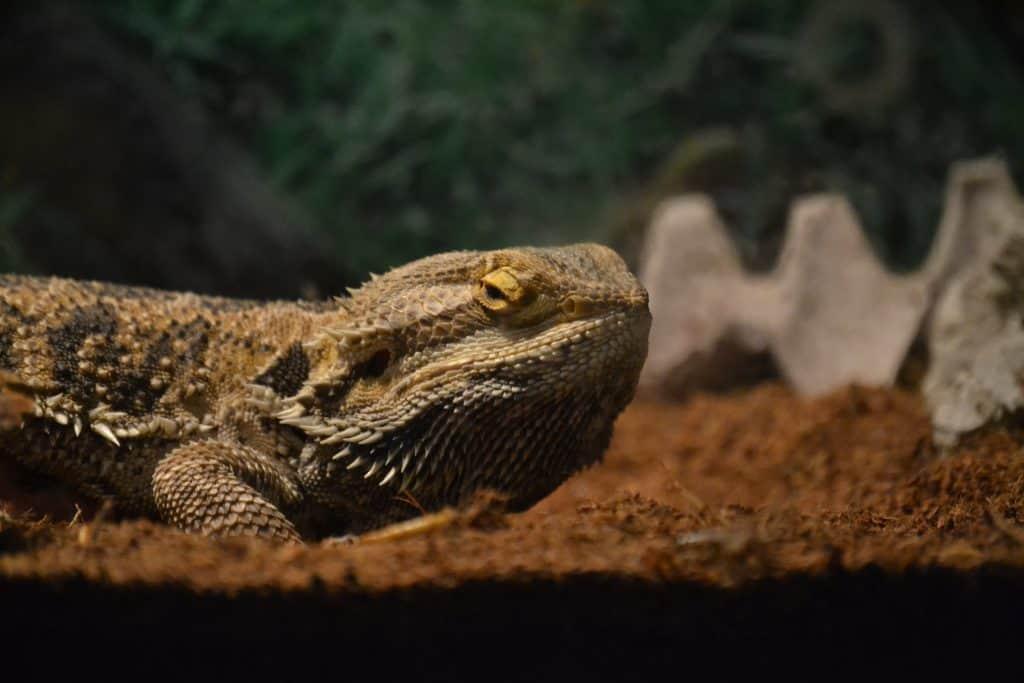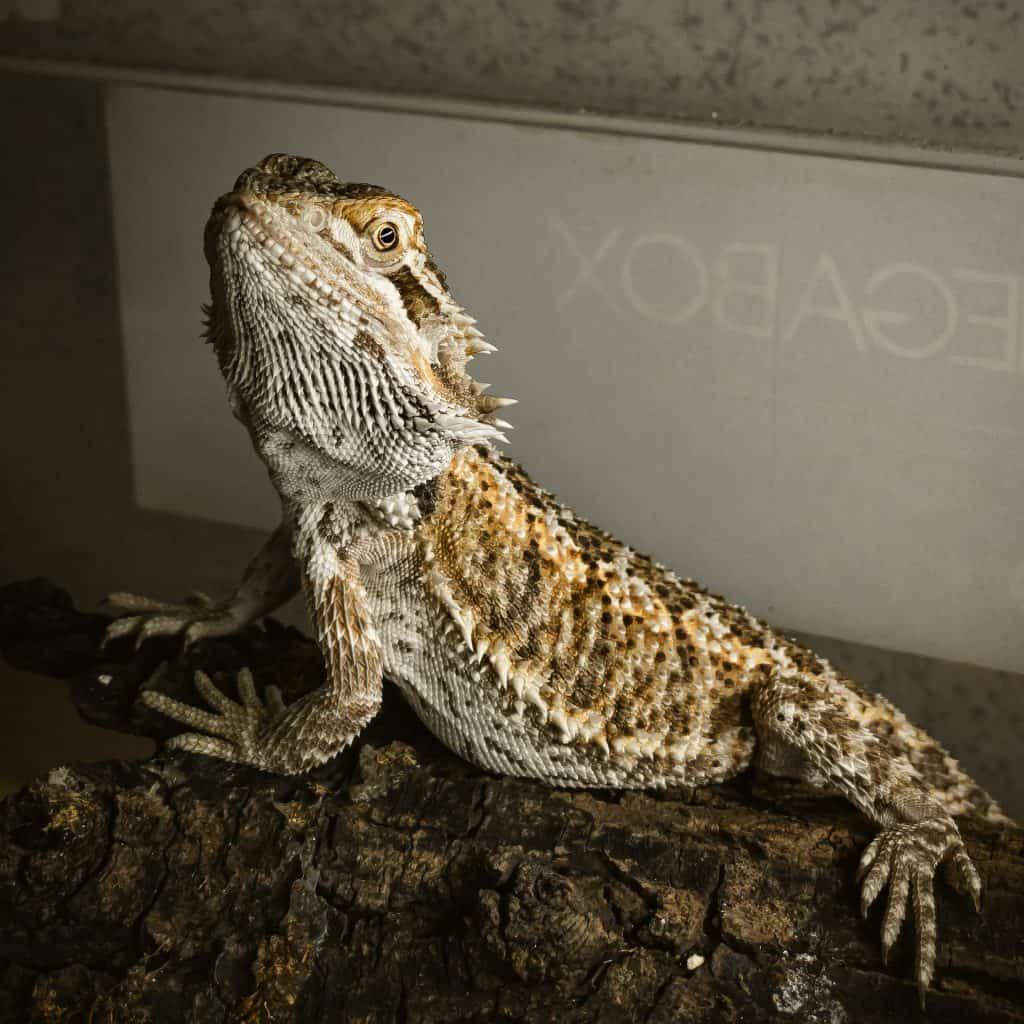There are various reasons why your bearded dragon is not pooping. Some of those reasons may include the following:
- Impaction
- Brumation
- Constipation
- Dehydration
- Improper husbandry techniques.
- Stress
Fortunately, the cause for your bearded dragon not pooping may be resolved by making simple changes in your lizard’s husbandry. Likewise, there are situations where you will need veterinary care ASAP! If your lizard’s situation is not addressed, it may lead to the slow death of your bearded dragon.
You are viewing: Why Is My Bearded Dragon Not Pooping
In this article, you will find information to help you make that determination. You will also find out how often bearded dragons should be pooping.
How Often Should Bearded Dragons Be Pooping?
The frequency at which bearded dragons poop can vary with age. Bearded dragons poop more frequently when they are young. As they get older, they do so less frequently. The reason for this is that younger lizard has a higher metabolism. Their metabolism slows with age. The following is the frequency of pooping broken down by age:
- Three months or less: One to three times per day.
- Between 4 and 18 months old: Every other day.
- Adults: Every other day to once a week.
If you do not know your beardie’s age, you can estimate it by going by the length of your lizard:
- Under one month of age: 3-4 inches
- Six months of age: 11 inches
- Adult: 16 inches
Another factor that influences the frequency of pooping is the diet that they are being fed. For example, dragons fed a diet heavy on silkworms will poop more frequently because of the worm’s high calcium content.

What Are the Reasons for Bearded Dragons Not Pooping?
There are a number of reasons why bearded dragons stop pooping. When evaluating your bearded dragon, do not only focus on the fact that it is not defecting. Also, consider its overall energy level and its appetite. If your pet is active and still has an appetite, you may be able to resolve your pet’s issue on your own. If your bearded dragon is not eating and is lethargic, it may be a more serious matter. The more common reasons why bearded dragons stop pooping include the following:
Impaction
Impactions occur when the lizard develops a blockage in their digestive tract. The blockage may be due to certain food items or substrates from their enclosure. Certain food items, such as mealworms, have a tough outer coating known as chitin. When meal worms are fed too frequently, the chitin can accumulate in the digestive tract and cause blockage. Also, ingesting substrate while feeding can also result in digestive blockage.
Besides not pooping, other signs of impaction include:
- The lizard has difficulty using their hind legs.
- Regurgitation
- Leathery
- Bloating
A balanced diet for bearded dragons consists of protein and fiber. Protein can come from insects and fiber from vegetables. Fiber is important because it helps promote digestion. Young bearded dragons tend to eat more insects than vegetables, while adults eat more vegetables.
Feeding mealworms to your bearded dragon too frequently increases the risk of them getting impactions. This is especially true in young bearded dragons. If a bearded baby dragon is not pooping, and mealworms are a big part of its diet, it would be wise to suspect that it has an impaction. To avoid impactions, feed mealworms sparingly and encourage them to eat more vegetables.
Also, bearded dragons may eat substrate to obtain certain materials, such as calcium. By providing mineral supplements, you can ensure that your dragon is getting the minerals it needs without ingesting substrate.
If you suspect that your bearded dragon has an impaction, I strongly recommend that you have it seen by a veterinarian as soon as possible. Left untreated, impactions can lead to paralysis of the hind legs and create a curvature of the spinal cord. Impactions block the elimination of waste from the digestive tract. When this happens, the waste accumulates, becomes toxic, and eventually kills the animal.
Brumation
Brumation is similar to hibernation in that it allows animals to slow down their metabolism to conserve energy during wintertime. The biggest difference between brumation and hibernation is that brumating animals do not become a completely dormant state as hibernating animals do.
If your bearded dragon is not pooping in the wintertime, it may be in brumation. During brumation, animals may occasionally move about and even eat. Obviously, a bearded dragon in brumation, who does not eat, will not poop either.
Read more : Why Is Bakersfield So Bad
During brumation, bearded dragons will find a place to hide. They may remain there for up to three months. If your bearded dragon is brumating, do not disturb it but continue to offer it food and water. Also, reduce the lighting to eight hours a day and lower the enclosure’s temperature to 72-75 degrees Fahrenheit.
Also, it is important to know the difference between a bearded dragon in brumation and one with a health issue. A bearded dragon that is going into brumation will find a secure place to hide. Also, they will have an otherwise healthy appearance though they may be sluggish and not eating.
In contrast, an unhealthy bearded dragon may remain in the open, be sluggish, and have an unhealthy appearance.
🦎 Note: Bearded dragons do not brumate until they reach the age of nine months or older.
Constipation
Constipation is not uncommon among captive bearded lizards, and it is often caused by not having their husbandry needs met. When constipated, bearded lizards may eat but not poop.
Constipation can occur in lizards not fed a proper diet, are dehydrated, or have an impaction. To relieve constipation, or to prevent it from happening, give your bearded dragon a warm bath several times a week. If the bath does not relieve the symptoms, I recommend that you have your pet seen by a veterinarian.
🦎 Note: Details on bathing your bearded dragon can be found later in this article.
Dehydration
While bearded dragons are desert animals, they still need to have access to water at all times. If your bearded dragon is not getting enough water, it will become dehydrated. Further, a bearded dragon that is dehydrated may stop pooping.
You can determine if your bearded dragon is dehydrated by performing this simple test. Gently pull on your dragon’s skin and then let go If the skin immediately snaps back, your pet is probably not dehydrated. However, if the skin is slow to return, your bearded dragon may be hydrated.
Other symptoms of dehydration include:
- Sunken eyes
- Appears weak and lethargic.
- Difficulty with shedding.
- Constipation
- Infrequent pooping.
If your dragon is dehydrated, get it to drink. You can also offer Pedialyte or Gatorade for the electrolytes. Using an eye dropper to wet your pet’s nose may also cause it to drink.
Improper Husbandry Techniques
If bearded dragons are not kept at the correct temperature and lighting, they will not eat. Or, they may eat but may not be able to digest their food properly. Either of these situations causes your lizard not to poop.
Temperature
The enclosure for reptiles should provide a temperature gradient, meaning that parts of the enclosure are warmer than other areas. This will allow your pet to seek the optimal temperature it needs at any given time.
The warmest part of the enclosure should be between 92-110 degrees Fahrenheit, while the cooler part should be between 75-85 degrees Fahrenheit. I suggest getting two thermometers so that you can keep track of the temperature in both parts of the enclosure.
Lighting
Another important part of keeping bearded dragons is providing UVB and UVA lighting. As with temperature, the correct lighting is needed if your lizard is to eat and properly digest its food. UVB and UVA lighting affects the digestion process, which affects how often the lizard poops.
Also, UVB bulbs lose their UVB output after six months, so I recommend replacing them every six months.
Stress
Read more : Why Is Hard Work Important
If your bearded dragon feels stressed, it may not eat, which also means it will not poop.
Common causes of stress for bearded dragons include:
- Lack of proper lighting or temperature.
- Being bullied by cage mates.
- Not being offered a nutritional diet.
- Making changes to the enclosure can lead to temporary stress.
- Disease
- Distractions from outside the enclosure.

What You Can Do to Help Your Bearded Dragon Poop
In the last section, we covered the most common reasons for bearded dragons not pooping. In this section, you will learn about ways to get your bearded dragon to eliminate.
The Dragon Bath
Whether your bearded dragon is pooping or not, giving it a bath can be beneficial to its health. I recommend giving your pet a bath twice a week. The water should be warm, and its depth should be up to the height of your pet’s shoulders. Let your bearded dragon soak for 15 minutes. Giving your beardie a bath will often help with constipation. Additionally, giving your bearded dragon will help keep it hydrated.
Though giving baths can be helpful in relieving constipation, it is not a cure for it. You would still need to identify the root cause of your pet’s constipation.
Note: Never leave your bearded dragon unattended when it is taking its bath.
A Laxative for Your Lizard
Another method for inducing pooping is to provide your beardie with a laxative. You can create a laxative by preparing a fruit puree using a high-fiber fruit such as banana, apple sauce, or pumpkin. Feed your beardie the puree using a 1-milliliter syringe. Providing a high-fiber puree may help your lizard with its digestion.
Olive Oil Dipped Bugs
You can help your dragon out by offering it insects that have been dipped in olive oil. Or try mixing olive oil with water and then offering it to your pet with a syringe. Use 0.1 milliliters of olive oil for every 100 grams of your lizard’s weight. In other words, if your bearded dragon weighed 300 grams, you would give it 0.4 milliliters of olive oil.
When mixing the olive oil with water, use 1/3 oil to 2/3 water. Give this treatment for three to four days. You can also try to put the mixture on your lizard’s nose. It may lap it up, which will make it easier on you.
Change Your Dragon’s Diet
Bearded dragons are omnivorous, meaning that they eat animal and plant matter. As such, they need a balanced diet. Offering a balanced diet will help with their digestion. When young, the diet of bearded dragons should comprise a larger percentage of protein than plant matter. As they get older, their diet should contain a larger percentage of plant matter than protein.
Since the diet of young beardies is largely insects, it is important that you avoid feeding them too many insects that contain chitin. Insects that would fall into this category include mealworms and large cricket. As for the adults, give them plenty of high-fiber vegetables. By feeding them this way, you will reduce the chances of your bearded dragons developing impaction or constipation.
The following vegetables have a high fiber content:
- Kale
- Turnip greens
- Bell peppers
- Asparagus
- Collard greens
- Zucchini
- Carrots
- Cucumber
- Celery
- Spaghetti squash
- Yellow squash
As alternatives to feeding mealworms and crickets, consider feeding the following insects:
- Phoenix worms
- Silkworms
- Butter worms
- Earthworms
- Dubia roaches
- Locust
- Cockroaches
- Crickets
Make that Vet Appointment!
If none of the suggestions in this article seem to be helping, it is time to call your veterinarian. Also, do not put it off. If the cause of your beardies problem is an impaction, it will get worse with time and could lead to your dragon’s death.
Final Thoughts
We hope that you enjoyed this article. It is important to be aware of your bearded dragon’s elimination behavior as it can indicate that problems exist in their husbandry. Your lizard not pooping is the most significant of such behaviors. We welcome your comments and the sharing of this article.
Source: https://t-tees.com
Category: WHY
